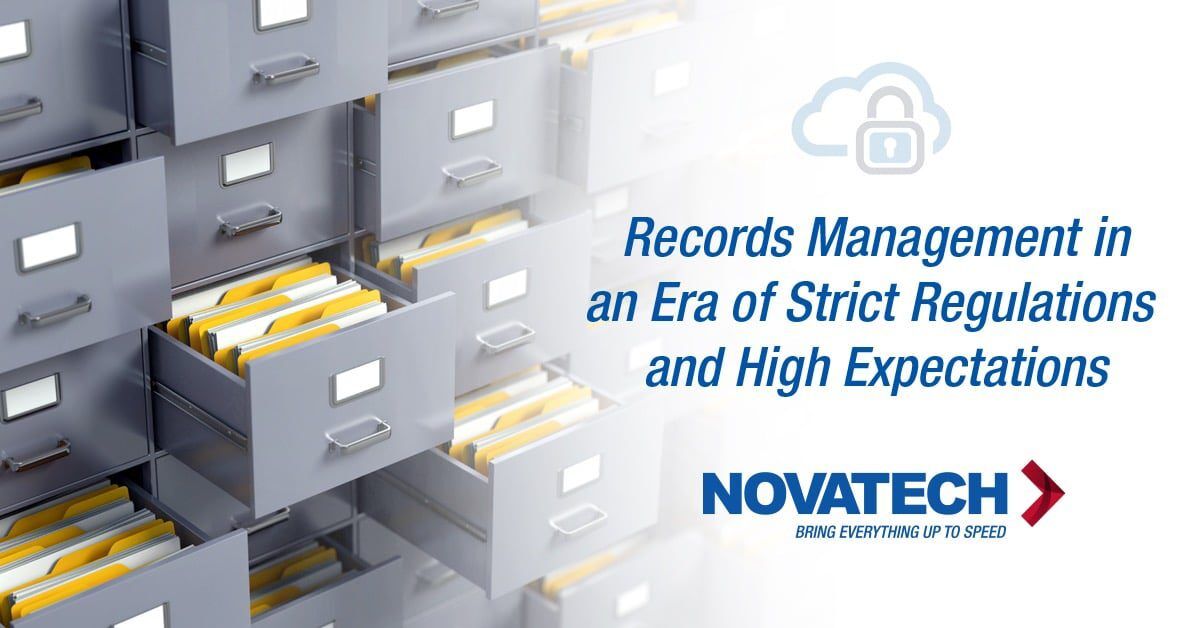Records Management in an Era of Strict Regulations and High Expectations
3 min read

Only a few decades ago, deregulation had left many firms without substantial records and compliance mandates. Today, stock market crashes and exploding healthcare legislation have resulted in regulation and compliance becoming mandatory in many industries.
Furthermore, records management and retention are now necessities not only for regulatory purposes but also to reassure clients that material is being properly administered and archived. Consequently, many companies have established internal compliance rules to boost client confidence. Regardless of the reason, records management — from documents and blueprints to emails and other communications — has again moved to being front and center for prudent business owners.
What Constitutes Record Management?
Records management, the control of business records from their formation to their disposition, involves tracking the creation, retention, maintenance and destruction of a final and unalterable version of every file. Retention schedules may be established by federal or state law or by organizational policies.
If an organization chooses to retain its records after the period specified by a legal requirement, or if they possess records not governed by a regulatory statute, they may still be subject to subpoena and review. For this reason, it’s vital that firms determine the useful or necessary life span of their business records and take proper steps to secure them for that period.
Business records may have different retention schedules based upon how they might be used. For example, e-mails, log files and correspondence are certainly useful for current business dealings, but they might also be useful for reference on past business matters. Additionally, if an organization is audited by a government entity, records compliance with appropriate laws will be critical to surviving the audit.
Nevertheless, at some point, all records can become a liability either due to the storage space they consume or the potential they might be seen by unauthorized individuals unless they are stored in a highly secure manner. This is why “cradle to grave” records management is so crucial. These activities can be conducted without use of a document management system, but it is much easier to manage business records when they are already in a digital format and stored in a platform that includes records management functionality.
Data Breaches Up the Ante
In addition to records retention and compliance issues, organizations must now be aware of the security risks related to records management. Cyberattackers no longer fit the “curious geek in the basement” profile. Most cyberattacks are conducted by hackers sponsored by foreign entities. Given that one in four organizations will experience a data breach in any given year, every employee in a firm has access to nearly 11 million files, and 67% of firms have 1,000 or more sensitive files available to every employee, the importance of protecting files in all formats cannot be overstated.
In some small to midsized firms these numbers may be a bit lower, but they are still too high. We hope corporate leaders know exactly how much data they retain — not just current client and employee data but also partner data and data relating to departed workers, clients and partners.
Networked Printers and Copiers: The Hidden Vulnerability
Even printers and copiers can leave documents open to being stolen — and not because someone leaves a printed document lying on them. Many advanced printers and copiers now contain hard drives where they store documents users send for printing. This is a great convenience for both company personnel and cybercriminals.
If a printer or copier is connected to a corporate network and the network is hacked, any documents stored on the device will be vulnerable. Even more disconcerting, an estimated 60% of companies have experienced a data breach through their printer or copier.
In the final analysis, records management is pivotal to company security and compliance. As a bonus, it also plays an important role in enterprise success by improving customer service, reducing overall operating costs and underscoring the firm’s commitment to being trustworthy. Ready for the best news of all? You and your staff don’t have to perform the conversion. Novatech’s experts can handle it all for you. To learn more, call (800) 264-0637.


